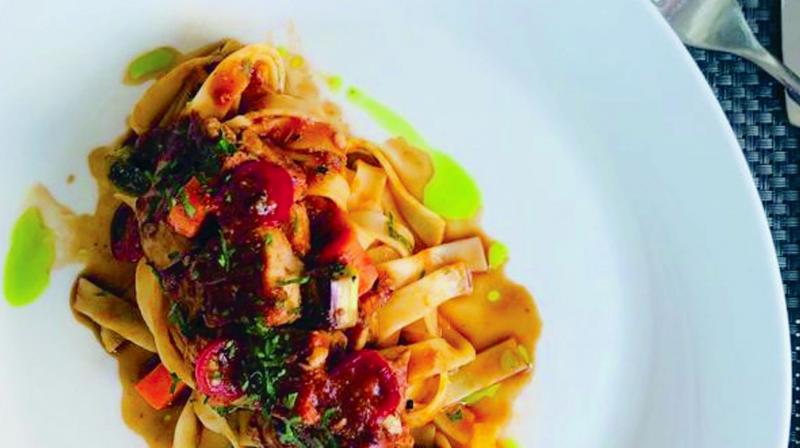Slow cooking for long-lasting flavours

While the world is running after fast food, let’s not forget the good old times when food was made at leisure and flavours lasted forever. Traditionally, Indian chefs have always favored the elaborate cooking methods and techniques which the world is now exploring in depth — for instance, slow stewing of kormas, braising of lamb raan, the slow roasting of whole meat carcass in tandoor and pit slow cooking of spiced meat in rural areas. The best thing about the return of slow cooking trends in commercial kitchens is the revival of classic recipes and delightful flavours that never fails to impress.
So what exactly is slow cooking? Chef Prem K. Pogakula, Executive Chef at The Imperial New Delhi, explains, “We know that when we heat our food on the burner, the heat rises up on the sides of the pot and the food within is heated. The slow cooking concept works similarly. In this process, the base of the slow cooking pot transfers heat up to the bottom of the dish. This heat then spreads to the sides of the dish and cooks the food inside. Slow cooking pots are useful throughout the year. For instance, on a cold winter day, the aroma of hot soup is welcoming and in summers slow cooking pots do not heat the kitchen the way an oven might do. It brings out the flavour in foods. A wide variety of foods can be cooked in it, including one-pot meals, soups, stews and more. Less expensive or tough meats, such as chuck steaks or roast and less lean stewing meats, are tenderised through the long cooking process.”
Across the world, chefs have been ‘sous vide’ slow-cooking vacuum-packed food in water baths for years. Now technological advances mean the home cook can use sous vide too. Sous vide’s history started in NASA labs in the 1960s, with sealed-bag meals prepared for astronauts; then it moved to 1970s France, where nouvelle-cuisine chefs such as Albert Roux and Henri Gault loved the idea. They knew the old technique of cooking en papillote (in an oiled paper bag) to seal in flavour and juices; plastic was simpler.
Speaking about the evolution of slow cooking in modern kitchen, chef Pogakula elaborates, “I like sous vide cooking method (which means sealed bag cooking) a lot. Like all good things, great professional innovations in cooking transfer to the domestic kitchen pretty quickly. Sous vide has been slow because, of course, of the boil-in-the-bag taint, but also because of expense. Low cookers usually allow one-step preparation. Placing all the ingredients in the slow cooker saves preparation time and cuts down on cleanup.”
Cumin and star anise lamb shank with malai broccoli
Ingredients
Lamb shanks 1200 gm
Cumin seeds 15 gm
Star anise 10 gm
Tomato paste 150 gm
Carrot (big chunks)
120 gm
Leeks (big chunks) 80 gm
Celery (big chunks) 50 gm
Onion (¼) 50 gm
Elephant garlic
cloves 5 gm
Cooking red wine 400 ml
Bay leaf 1 gm
Peppercorn 3 gm
Lamb stock 2 litre
Refined oil 250 gm
Salt to taste
Method
Toast the cumin and star anise in a pan and keep aside
Heat the oil in roasting tray and sear the lamb shanks until it turns golden and keep aside
Add vegetables and saute until charred colour comes to it, add cumin and star anise
Deglaze with wine and reduce till 1/10
Add stock and tomato paste to it
Return back the lamb shank and cover with aluminum foil
Braise in the preheated
oven at 160 temperature for four hours
Take out the shanks and strain the stock and reduce to sauce consistency
Tuscan pork and pepper stew
Tuscan pork and pepper stew
Ingredients
Boneless pork loin roast, cut into 1-inch cubes 750 gm
Olive oil 2 tablespoons
Diced tomatoes 5
Chicken broth 2 cups
Peppers slices 2 nos
Dry red wine ½ cup
Orange marmalade 50gm
Minced garlic cloves 2 nos.
Dried oregano- 1 teaspoon
Fennel seed ½ teaspoon
Pepper ½ teaspoon
Crushed red pepper flakes (optional) - 1/8 teaspoon
Cornstarch 2 tablespoons
Cold water 2 tablespoons
Hot cooked fettuccine (optional)
Method
In a large skillet, brown pork in oil; drain.
Take a large pot and Stir in the tomatoes and add stock, vegetable blend, wine, marmalade, garlic, oregano, fennel seed, pepper and pepper flakes if desired. Cover and cook on low for 8-10 hours or until meat is tender.
Combine cornstarch and water until smooth; gradually stir into stew. Cover and cook on high for 30 minutes or until thickened. Serve with fettuccine if desired.
Lemon chicken with makhani gravy and mustard potatoes
Ingredients
For Marination
Chicken breast 200 gm
Lemon rind and
lemon juice 2 nos
Salt black pepper to taste
Chopped thyme 3 gm
Cajun spice half teaspoon
Oil to grill 10ml
Makhani gravy 100ml
Boiled Baby potato 4 nos
Kasundhi mustard 10 gm
Coriander spring for garnish
Method
Marinate chicken with mentioned spices and keep aside for one hour
Grill and cook in the oven and keep aside
Now season baby potato with mustard and keep on a slow flame to heat it up
ln another pan heat makhani gravy and keep aside
Now plate with all the above ready dishes and serve hot.

